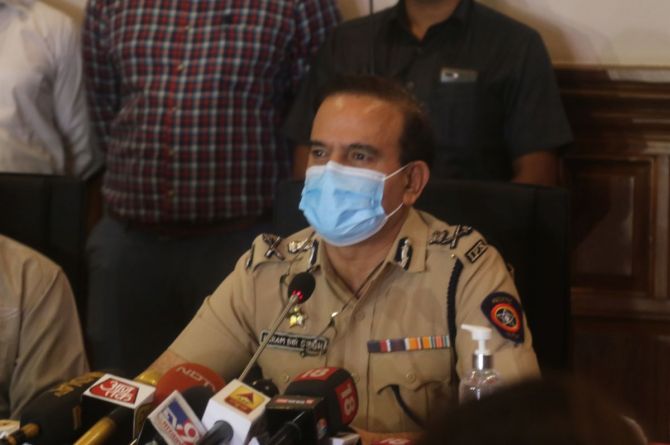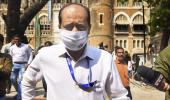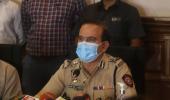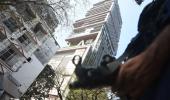'Police officers should be selected on merit and not on the basis of who is close to the political party in power.'

Dr Meeran Chadha Borwankar, who retired from the Indian Police Service in 2017 as a director general of police, was known for her no-nonsense approach towards corruption and political interference in policing decisions throughout her 36-year career as an IPS officer.
As joint commissioner of police, Mumbai, Dr Borwankar headed the Mumbai Crime Branch and, according to the legendary police officer Julio Ribeiro in an Indian Express article last week, cleaned up the Crime Branch of dubious detectives.
Dr Borwankar spoke to Prasanna D Zore/Rediff.com about suspended Assistant Police Inspector Sachin Waze's alleged involvement in the Antilia bomb scare case and Param Bir Singh's transfer as Mumbai's police commissioner. The concluding segment of a multi-part interview.
- Part I: 'Police and politicians are together in the notorious hafta system'
- Part II: 'There could be a bigger plan to teach Ambani a lesson'
You have served in the Maharashtra police between 1981 and 2017.
Based on this experience, what police reforms do you think are needed to make the entire law and order and policing system more transparent?
Three immediate reforms: Establishment of State Security Commission and Establishmnet Boards as suggested by the Supreme Court.
Police officers should be selected on merit and not on the basis of who is close to the political party in power.
In Maharashtra, even the Establishment Board has been breached because of the police-politician nexus.
As of today, the DGs and commissioners' post are generally going to those IPS officers who are close the chair (politicians in power).
Setting up of a State Security Commission will design and monitor the situation closely leading to postings done as per the merit and record of the officer -- not only at the senior level but at all levels: From thana (the local police station) to the commissioner of police, DG.
The second reform would be to separate the law and order and crime (jurisdictions).
The police are so damn overworked that citizens are getting a terribly raw deal.
If there is a house break somewhere today and there is a visit of the chief minister in the area, all the cops in the police station would be on bandobast duty for the chief minister.
Nobody will be able to either record my FIR or even if an FIR is recorded, no further investigation will be done because they are so overburdened with bandobast/the law and order duties.
The third immediate reform would be to set up an independent Police Complaints Authority consisting of apolitical eminent citizens.
What is happening is if I have complained against an inspector and this is being inquired into by an ACP (assistant commissioner of police_. Whatever you may say, the uniform has a brotherhood and sisterhood, and we try to defend each other.
An independent PCA, separation of law and order and crime, a State Security Commission and Establishment Boards for postings at all levels based on merit and not based on the proximity to political parties.
In your 36 year career as an IPS officer, what has been your most challenging time? And how did you overcome those challenges?
In my journey as an IPS officer between 1981 and 2017, I was fighting on two fronts. One was because of my gender as women (IPS officers) were very rare and wherever I would go (was posted), it would make news.
For getting the post of district police chief in Aurangabad in 1991, my file went to the chief minister three times. They thought how a woman would work as an independent police chief in a district; those were the days when there was no reservation for women.
Then when I was appointed as JCP (joint commissioner of police) and later commissioner of police, Pune, every time the question asked was: Will she be able to do it?
Of course, I had gained that kind of confidence that they would consider me and they would give (appoint) me, but it was a journey of gender.
The second challenge was of professionalism.
Everywhere I had to prove (myself) and therefore I had to work hard. To understand what was happening I had to learn the language (being from Punjab, she had to learn Marathi); then the culture of the police, the state and then the intricacies of investigations.
Luckily for me, I was posted twice in the CID, once in the CBI, and once in the Crime Branch.
I remember once I had gone to the Yerawada police station as commissioner of police Pune and asked for the case diaries of investigations. I could pinpoint the flaws and make out that investigations were very mediocre. In anger and anguish, I walked out of the police station.
The news spread among all police stations. I very strongly feel and used to emphasise the need for improving our investigations. Poor conviction rate highlights the same. But if money is the focus, how and why will officers work hard on investigation!
So, learning about investigations, professional policing and handling law and order was a challenge.
As a young DCP (deputy commissioner of police) in Mumbai, there was one magisterial inquiry in an incident where my car was burnt in a riot in the Kamathipura area (central Mumbai); another judicial inquiry by a retired high court judge because four people had died in the police firing in Chembur (north east Mumbai) where I was involved.
What would be your message to India's young women?
If we take our jobs seriously, in whatever career we have selected, and put our best efforts, then gender doesn't matter. Acceptance of our capabilties may take some time though.
It is always teamwork that brings success.
Whenever we achieve something it's not because of an individual, but for all, seniors, juniors and colleagues joining hands with us. Whatever success we had when I was in the Crime Branch was because of the teamwork.
Balance in life, personal and professional is essential. And seeking our own happiness and well-being should not make us feel guilty. It is healthy and positive. Go for it.










